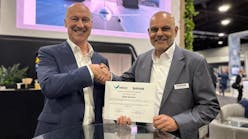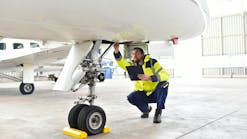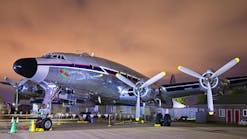Boom Supersonic Convenes Net Good Summit to Drive Sustainable Future of Travel
Boom Supersonic, the aerospace company building the world's fastest and most sustainable supersonic airliner, and the founding members of its Sustainable Travel Forum today reported learnings from the inaugural Net Good Summit in Lake Tahoe. The Net Good Summit was an intimate, two-and-half-day gathering convening fifty industry leaders, sustainability experts, and creative thinkers to drive action and innovation in sustainable travel.
"At Boom, we believe that travel is a net good for humanity—connecting us with one another, driving economic growth, and fostering global cultural exchange. We launched the Net Good Summit from a belief in the benefits of travel not just for people, but also for the planet," said Kathy Savitt, Boom president. "I'm thrilled that such a diverse set of leaders joined us at the Summit. Sustainability is core to our business, and we understand the role cross-sectoral collaboration can play in solving the wider challenge of making travel sustainable."
With twenty-five speakers from backgrounds including aviation, electric vehicles, clean energy, sustainable fuels, tourism boards, and sustainability nonprofits, the event is centered around the following guiding themes:
- Decarbonizing Transportation: The future of transportation—from long-haul flights to ground transport—must be safe, clean, and accessible.
- Enabling Technologies: Climate change has become a defining challenge of our time, requiring innovative solutions and radical thinking.
- Sustainability Governance: Transitioning the global travel industry to sustainability requires rethinking reporting, investing, and corporate governance.
- Responsible Tourism: When responsibly planned and managed, tourism supports the conservation of biodiversity, stimulates economic growth, and empowers communities.
Several key learnings emerged from the discussions and informal gatherings at the Net Good Summit. While scientific and technological progress are critical, humanity is core to sustainability. From enrolling employees inside an organization to ensuring the entire value chain—including customers and users—shares a belief in the importance of sustainability, people are key to bringing about meaningful change. Travel provides significant social benefits, helping people connect with cultures other than their own. Customers want to travel responsibly, and the travel industry has a unique opportunity to accelerate the adoption of clean, renewable energy. The entire travel industry must ignite change and measure the results of their efforts to develop a new future of travel.
"Sustainability is not going to be solved by just the travel industry. It's got to be a mixture of the travel industry, legislation, governance, investors, that all come together in a sensible way to try and solve the systemic problems," said Mark Stevenson, futurist, author, entrepreneur and speaker at the Net Good Summit.
The Net Good Summit program featured a vibrant mix of science, futurism, design and travel experts, including:
- Tim Brown, Executive Chair, IDEO
- Andrew Chen, Principal for Aviation Decarbonization, RMI
- Randy Durband, CEO, Global Sustainable Tourism Council
- Franziska Gsell, Chief Marketing Officer, IWC Schaffhausen
- Dr. Lourdes Maurice, Former Executive Director, FAA Office of Environment and Energy
- Nora Lovell Marchant, VP, American Express Global Business Travel
- Jerry Mpufane, President, South African Tourism North America
- Lauren Riley, Managing Director, United Airlines
- Mark Stevenson, Futurist, author, and entrepreneur
- Madge Thomas, Head of Corporate Social Responsibility, American Express
- Christopher Wendel, Co-founder & President, Volta Charging
- Dr. Donald J. Wuebbles, Harry E. Preble Professor of Atmospheric Science, University of Illinois, Urbana-Champaign and White House Climate Advisor
- Additional speakers from Boston Consulting Group, Climeworks, Local Motors, Tourism Australia, VisitBritain and more.
"Corporations are engaging more deeply than ever on sustainability issues, igniting new possibilities for innovators like Boom and our partners at the Net Good Summit to make a difference," said Savitt. "Building on the success of the first Summit, we are excited that planning is underway for next year's event, which will take place in the fall of 2022."
Late last year, Boom became the first aircraft manufacturer to sign The Amazon Climate Pledge. Overture, Boom's first commercial supersonic airplane, will be capable of net-zero carbon on a life-cycle basis and will be capable of flying on 100% sustainable aviation fuel (SAF). In June, United Airlines committed to operate its fleet of up to 50 Overture airliners at net-zero carbon.
Net Good Summit Partners
- American Express: The payments company and Boom investor, that offers travel and lifestyle related services to consumers and businesses around the world, has a multi-pronged sustainability program involving facilities, business operations, customers, and partners.
- Belvedere Vodka: The super-premium vodka, that launched this year its first organic certified vodka range, has a range of innovative programs for sustainable farming and packaging and the use of biomass capture to power its production facilities
- IWC Schaffhausen: The Swiss luxury watchmaker, specializing in professional pilot's watches, recently announced a partnership with Boom to advance sustainable business practices in both companies. IWC has pioneered a number of sustainability initiatives in the watch industry, for example reducing the weight and volume of packaging, the responsible sourcing of precious metals, the use of renewable energy globally, and the development of paper-based watch straps.
- Paravel: Creators of the first-ever carbon-neutral suitcase, Paravel is the premier sustainable travel lifestyle brand. A Climate Neutral Certified company, and winners of the Travel & Leisure Global Vision Award, Paravel's luggage, bags, and organizers are crafted from upcycled and sustainable materials. Through their products, partnerships, and other eco-centric initiatives, the brand has offset 12,266 tonnes of CO2, upcycled over 3.5+ million plastic bottles, and planted over 166k trees through Eden Reforestation Projects.
- United Airlines: United is committed to 100% green by reducing its greenhouse gas emissions 100% by 2050, without relying on traditional carbon offsets. The world leader in the usage and support for the development of SAF, an alternative fuel made with non-petroleum feedstocks, United already has agreements to purchase nearly twice as much SAF as the known agreements of all other global airlines combined. SAF has the potential to deliver the performance of petroleum-based jet fuel but with a fraction of its carbon footprint.





